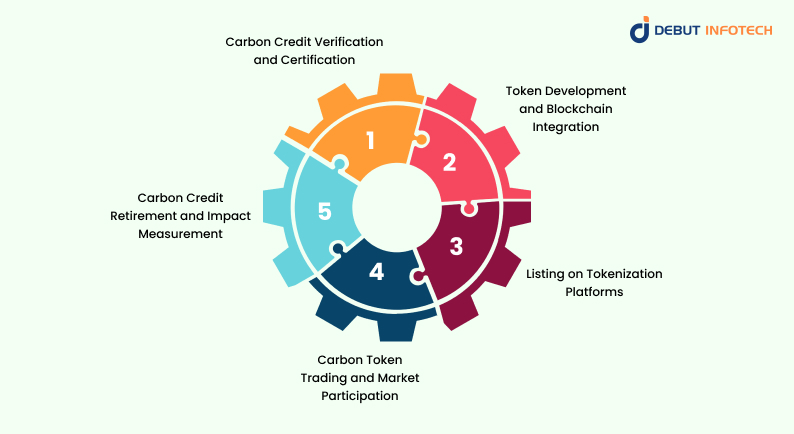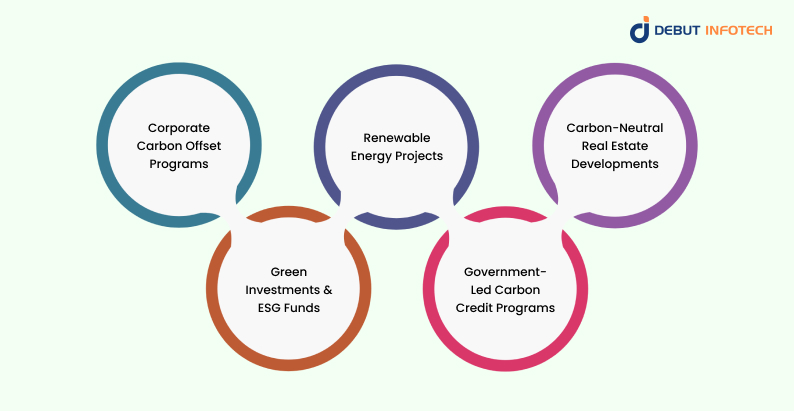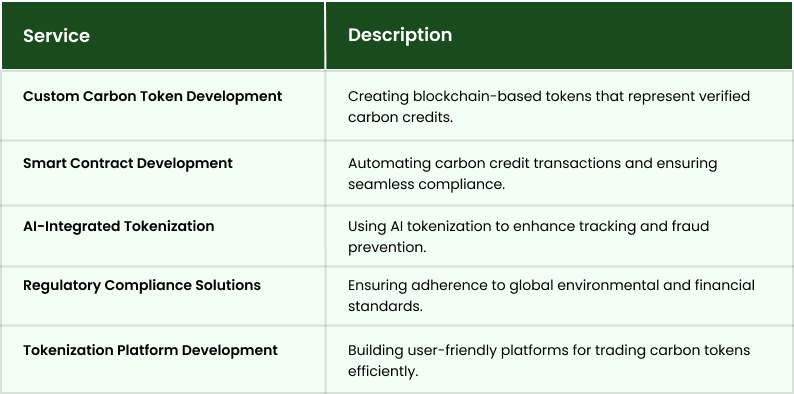Table of Contents
Home / Blog / Tokenization
Carbon Tokenization: A Sustainable Path to Impact
March 11, 2025

March 11, 2025
An innovative set of financial tools that encourage carbon reduction has emerged in response to the critical need to manage climate change. One of these improvements is carbon tokenization, which combines carbon credit systems with blockchain technology. Carbon tokenization improves the accessibility, liquidity, and transparency of sustainability-driven investments by turning carbon credits into digital assets. Thanks to this breakthrough, there is now a more effective and provable method for lowering carbon footprints, and it is changing the way governments, organizations, and individuals engage in carbon offset programs.
Tokenization has already changed existing businesses, like real estate and financial securities. Its acceptance in the carbon credit market offers a good path for encouraging environmental responsibility using blockchain security and efficiency. However, what are carbon tokens, and how do they function? In this article, we will explore the basics of carbon tokenization, its advantages, important participants, and how tokenization firms influence the trajectory of carbon credits.
Make sustainability profitable!
Explore how carbon tokenization can transform your business by enabling seamless carbon credit trading and offset management.
What is Carbon Tokenization?
Tokenizing carbon credits means turning them into digital assets that can be traded on blockchains. Carbon credits are licenses allowing businesses to release a defined amount of CO₂ specifically. Should an entity lower its carbon emissions below their allocated limit, it can sell extra credits to other companies needing to offset their emissions. Tokenizing these credits raises carbon trading’s traceability and integrity.
Blockchain-based carbon tokens offer several advantages, including:
- Enhanced transparency – Immutable records ensure that carbon credits are not double-counted or fraudulently claimed.
- Increased liquidity – Tokenization platforms enable easier trading of carbon tokens, making sustainability markets more accessible.
- Greater accessibility – Small investors and businesses can participate in the carbon credit market through fractionalized ownership.
This new methodology offers a decentralized and verified way to track and trade carbon credits, complementing worldwide attempts to lower carbon emissions.
How Carbon Tokenization Works

Tokenizing carbon credits turns them into digital assets that can be exchanged effectively, transparently, and securely on the blockchain. Several steps ensure that each tokenized carbon credit represents a real drop in carbon output. The process of carbon tokenization is broken out below, along with the main elements involved.
1. Carbon Credit Verification and Certification
Carbon credits must first be issued and checked by regulatory groups or environmental standards-focused third parties before they can be turned into tokens. These companies, like Verra or Gold Standard, make sure every carbon credit honestly lowers greenhouse gas emissions. Verify that the carbon credits are entered into a digital ledger ready for tokenization.
2. Token Development and Blockchain Integration
Carbon credits are turned into carbon tokens using blockchain technology once they have been confirmed. To represent the validated carbon credits, a token development company or crypto token development firm issues digital tokens to users. Coins like this are usually built on Ethereum (ERC-20), Binance Smart Chain (BEP-20), or Polkadot, all well-known blockchain networks.
Tokenized carbon credits are secure because blockchain technology makes them immutable and impossible to tamper with. Implementing smart contracts allows for the automation of transactions, increasing transparency by eliminating middlemen.
3. Listing on Tokenization Platforms
After token creation, digital carbon tokens are listed on tokenization platforms and environmental asset exchanges, where individuals and businesses can buy, sell, or retire them. These platforms function similarly to cryptocurrency exchanges but focus on sustainable assets, such as tokenized carbon credits and real-world asset tokenization projects.
4. Carbon Token Trading and Market Participation
Once listed, carbon tokens can be traded among investors, corporations, and governments looking to offset their carbon emissions. These transactions happen in real time, allowing for increased liquidity and global market participation. The tokenized nature of these assets ensures seamless cross-border transactions, removing the inefficiencies of traditional carbon markets.
For example, companies required to meet carbon neutrality goals can purchase carbon tokens on blockchain-based marketplaces. This process simplifies compliance with environmental regulations while providing a transparent record of carbon offset transactions.
5. Carbon Credit Retirement and Impact Measurement
A company or person wishing to offset emissions using a carbon token must “retire” it. This permanently removes it from circulation and guarantees that it will never be used again or resold. The blockchain records the retirement process, guarantees openness, and prevents double counting.
With data tokenization tools and analytics powered by artificial intelligence, businesses can monitor the effect of their carbon offsets in real-time, gaining valuable insights into how they are reducing emissions. These realizations enable companies and governments to evaluate their environmental influence and enhance their policies on sustainability.
Technologies Involved in Carbon Tokenization
1. Blockchain and Smart Contracts
Blockchain technology underpins carbon tokenization, providing a decentralized and immutable ledger for recording transactions. Smart contracts automate various aspects of carbon token management, including verification, trading, and retirement.
2. AI and Machine Learning (ML) in Carbon Tokenization
AI tokenization enhances the accuracy of carbon credit verification, fraud detection, and carbon offset impact measurement. AI-driven platforms can analyze environmental data, ensuring that carbon credits are valid and effectively contribute to emission reductions.
3. IoT and Remote Sensing for Carbon Credit Verification
Internet of Things (IoT) devices and satellite-based remote sensing technologies help monitor carbon reduction projects in real-time. These technologies provide data-driven verification for carbon credits before tokenizing them, reducing the chances of fraudulent claims.
4. Integration with Real World Asset Tokenization
Carbon tokenization can be integrated with real estate tokenization platforms and real world asset tokenization initiatives. For instance, companies developing eco-friendly buildings can use carbon tokens as part of their sustainability initiatives, linking them to real estate tokenization company projects.
Key Benefits of Carbon Tokenization
Carbon tokenization is a game changer for enhancing transparency, efficiency, and accessibility in the carbon credit market. By leveraging blockchain technology, carbon tokenization eliminates many inefficiencies in traditional carbon credit systems. Below are some key benefits that make tokenized carbon credits a game-changer for sustainability and investment markets.
1. Enhanced Transparency and Traceability
One of the primary advantages of carbon tokenization is the ability to ensure full transparency across the carbon credit lifecycle. Traditional carbon markets often suffer from a lack of clarity regarding the legitimacy and impact of credits. With blockchain-based carbon tokens, every transaction—from issuance to retirement—is recorded on an immutable ledger, reducing fraud and ensuring that each credit is used only once.
Smart contracts further enhance transparency by automating verification processes and providing real-time tracking of carbon credits. Investors, businesses, and regulators can easily verify carbon credits’ authenticity, building market trust.
2. Increased Market Accessibility
Traditional carbon credit markets are often restricted to large corporations and institutional investors due to high entry barriers and complex regulatory requirements. Tokenization platforms help democratize access to the market by allowing individuals, small businesses, and retail investors to participate in carbon token trading.
By integrating with real estate tokenization platforms and real world asset tokenization, tokenized carbon credits can also be bundled with other sustainability-driven investments, such as eco-friendly real estate projects and renewable energy initiatives.
3. Improved Liquidity and Faster Transactions
Unlike traditional carbon credit trading, which often involves lengthy approval processes and intermediaries, carbon tokenization allows for near-instant transactions. Tokenized carbon credits can be traded globally on blockchain-based tokenization platforms, significantly increasing market liquidity.
By eliminating the need for brokers and intermediaries, tokenization companies can facilitate more efficient and cost-effective transactions, reducing delays and administrative burdens. The ability to trade carbon tokens 24/7 on decentralized exchanges also enhances market fluidity.
4. Fraud Prevention and Reduced Double Counting
Fraud and double counting have been persistent issues in traditional carbon markets, where a single carbon credit is sometimes sold multiple times. Carbon tokenization addresses this challenge by ensuring each unique carbon token can only be used once.
With data tokenization and AI-powered verification, carbon credits can be tracked in real time, preventing duplication and ensuring that emissions reductions are accurately accounted for. This fosters confidence among investors and regulatory authorities, encouraging greater participation in the carbon credit market.
5. Cost-Effective and Automated Processes
Automating carbon credit issuance, verification, and retirement through blockchain-based smart contracts significantly reduces administrative costs. Businesses no longer rely on expensive intermediaries to verify and process carbon transactions.
Additionally, AI tokenization can streamline operations by analyzing emissions data, optimizing carbon offset strategies, and detecting anomalies in carbon credit trading. These advancements lower operational costs and make carbon credit trading more efficient for corporations and governments.
6. Alignment with Sustainability and ESG Goals
As environmental, social, and governance (ESG) considerations become increasingly important for investors and businesses, carbon tokenization provides a transparent and verifiable way to meet sustainability goals. Tokenized carbon credits can be seamlessly integrated into ESG portfolios, helping companies demonstrate their commitment to carbon neutrality.
Green bond tokenization is another avenue where tokenized carbon credits can be incorporated. Financial institutions issuing green bonds can use carbon tokens to enhance transparency and accountability in funding sustainability projects.
7. Scalability and Integration with Other Tokenized Assets
Carbon tokenization can be combined with various asset tokenization initiatives, including real estate tokenization company projects and real-world asset tokenization. By linking carbon credits with tokenized assets like green buildings, renewable energy projects, and eco-friendly infrastructure, organizations can create innovative investment opportunities.
For example, a token development company specializing in STO development can help investors combine sustainability-focused security tokens with tokenized carbon credits, providing a diversified and impactful investment portfolio.
Use Cases of Carbon Tokenization

1. Corporate Carbon Offset Programs
Companies aiming for net-zero emissions can use carbon tokenization to acquire verified carbon credits, ensuring regulatory compliance while enhancing their sustainability branding.
2. Green Investments & ESG Funds
Investors seeking environmentally friendly portfolios can invest in tokenized carbon credits, integrating them into real-world asset tokenization funds prioritizing sustainability.
3. Renewable Energy Projects
Solar, wind, and hydroelectric projects can tokenize carbon credits to generate additional revenue streams. These tokens can be sold to organizations looking to offset their emissions.
4. Government-Led Carbon Credit Programs
Governments can issue carbon design system tokens to incentivize businesses and individuals to adopt cleaner technologies and sustainable practices.
5. Carbon-Neutral Real Estate Developments
The real estate tokenization company sector is beginning to explore ways to integrate carbon offset strategies into property developments, promoting eco-friendly construction practices.
Challenges in Carbon Tokenization
1. Regulatory Uncertainty
Since what is tokenization is still an evolving concept in financial and environmental markets, regulatory bodies are still defining frameworks for legally recognizing carbon tokens.
2. Standardization Issues
While carbon tokens are gaining traction, global standardization is lacking, leading to inconsistencies in token value, certification, and tradability.
3. Market Volatility
Like other digital assets, carbon tokens may be subject to price fluctuations, making them less predictable for long-term sustainability planning.
4. Technical Barriers
The integration of token development into legacy financial and carbon trading systems requires significant technological upgrades and education.
5. Fraudulent Claims & Misuse
Despite blockchain’s transparency, some projects may attempt to issue illegitimate carbon tokens. Ensuring rigorous verification mechanisms is essential for maintaining market integrity.
How Debut Infotech Supports Carbon Tokenization
As a leading tokenization company, Debut Infotech provides tailored blockchain solutions for carbon tokenization initiatives. Our token development and blockchain integration expertise helps businesses and governments build secure, transparent, and scalable carbon trading platforms.
Our Services Include:

Debut Infotech’s deep expertise in blockchain and tokenization makes it a reliable partner for organizations looking to integrate sustainable financial solutions into their operations.
Ready to tokenize your carbon credits?
Partner with Debut Infotech, a leader in token development, to build secure and compliant carbon tokenization solutions that drive sustainable investments..
Conclusion
Carbon tokenization is making a massive change in the carbon credit market by bringing transparency, security, and accessibility to sustainable finance. Using blockchain technology, carbon tokens enable businesses, governments, and investors to participate in verified carbon offset programs easily.
Despite regulatory uncertainties and market volatility, advancements in token development and AI-driven solutions continue to strengthen this emerging market. With experienced tokenization companies like Debut Infotech driving innovation, carbon tokenization is set to play a significant role in shaping the future of sustainability.
By integrating carbon tokens into investment portfolios, businesses can actively contribute to climate action while capitalizing on a rapidly growing market.
Frequently Asked Questions
Q. What are carbon tokens?
Carbon tokens are blockchain-based digital assets that represent verified carbon credits. Each token is backed by a specific amount of carbon offset, allowing companies and individuals to compensate for their carbon footprint. By leveraging carbon tokenization, organizations can trade, track, and retire carbon credits more efficiently, ensuring compliance with sustainability goals and regulatory frameworks.
Q. How does carbon tokenization work?
Carbon tokenization involves converting carbon credits into digital tokens stored on a blockchain. These carbon tokens are issued based on verified emissions reductions and can be securely traded on tokenization platforms. Using blockchain ensures that transactions are transparent, immutable, and tamper-proof. Once purchased, a carbon token can either be held as an investment or retired to offset carbon emissions, preventing further use. This automated, trustless system eliminates fraud, double counting, and inefficiencies in traditional carbon credit markets.
Q. What are the benefits of carbon tokenization?
Carbon tokenization enhances transparency, market liquidity, accessibility, and integration with AI-driven sustainability strategies. Blockchain technology verifies transactions, allowing instant transactions and better price discovery. It also allows smaller investors and businesses to participate without high financial barriers. Each carbon token is unique, trackable, and prevents fraud by eliminating double counting and unauthorized reselling.
Q. What role do AI and data tokenization play in carbon tokenization?
AI and data tokenization play a crucial role in improving carbon credit markets’ accuracy, security, and efficiency. AI algorithms can analyze emissions data, predict carbon offset requirements, and optimize trading strategies. Meanwhile, data tokenization ensures that sensitive environmental data is securely stored and transmitted, reducing the risk of tampering or fraud. Integrating AI tokenization also enhances real-time tracking of carbon credits, enabling businesses to make more informed decisions regarding sustainability investments.
Q. How does carbon tokenization impact the real estate sector?
The real estate sector is actively exploring real estate tokenization platforms to integrate carbon offset strategies into green building projects. Developers and investors can tokenize carbon credits linked to energy-efficient properties, allowing buyers to support sustainable real estate initiatives directly. A real estate tokenization company can offer tokenized green bonds, enabling property owners to fund eco-friendly developments while providing investors with transparent, verifiable sustainability metrics.
Q. Are there risks involved in carbon tokenization?
Carbon tokenization offers advantages but also faces challenges such as regulatory uncertainty, price volatility, technical integration barriers, and security risks. Regulatory varying rules can impact adoption and trading, while market demand, climate policies, and government regulations can affect the value of carbon tokens. However, working with experienced firms can mitigate these risks and ensure secure and compliant carbon credit tokenization.
Q. How can businesses get started with carbon tokenization?
To adopt carbon tokenization, businesses should partner with a blockchain expert, develop a tokenization strategy, choose the right blockchain and smart contract framework, use AI and data analytics to optimize carbon credit trading, and regularly launch and monitor performance. Platforms like Ethereum and Binance Smart Chain offer secure and scalable solutions, while regular audits and compliance checks ensure transparency and market credibility.
Talk With Our Expert
Our Latest Insights
USA
Debut Infotech Global Services LLC
2102 Linden LN, Palatine, IL 60067
+1-708-515-4004
info@debutinfotech.com
UK
Debut Infotech Pvt Ltd
7 Pound Close, Yarnton, Oxfordshire, OX51QG
+44-770-304-0079
info@debutinfotech.com
Canada
Debut Infotech Pvt Ltd
326 Parkvale Drive, Kitchener, ON N2R1Y7
+1-708-515-4004
info@debutinfotech.com
INDIA
Debut Infotech Pvt Ltd
Sector 101-A, Plot No: I-42, IT City Rd, JLPL Industrial Area, Mohali, PB 140306
9888402396
info@debutinfotech.com



Leave a Comment